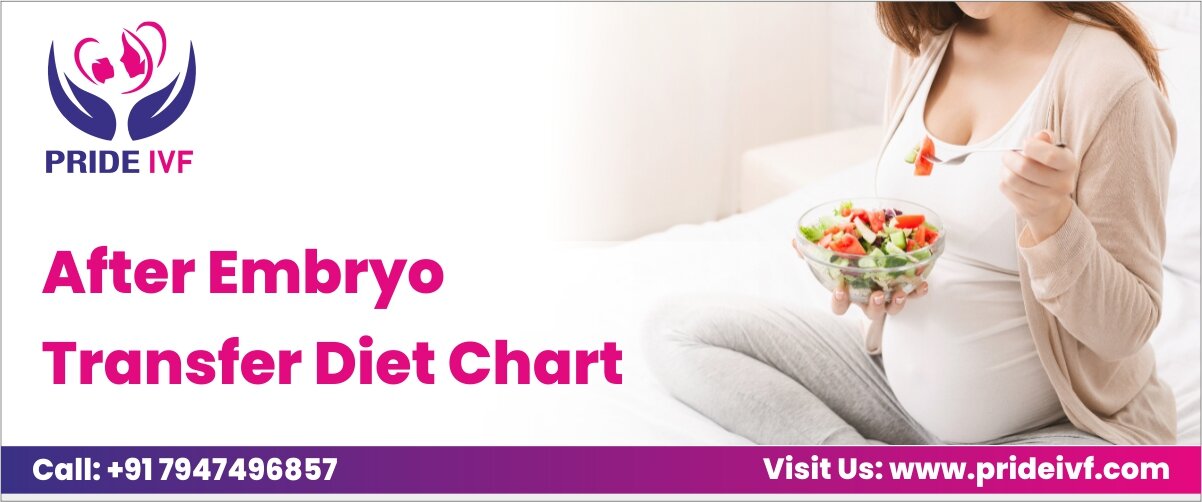The embryo transfer marks a crucial stage in the IVF journey. After the anticipation and meticulous steps leading to this point, fostering a healthy environment for implantation becomes paramount.
While medical intervention plays an integral role in optimizing the success of the implantation after the embryo transfer, dietary choices also play a significant role in influencing the success of the process.
This comprehensive guide by pride ivf centre in delhi will examine the detailed after embryo transfer diet chart, providing a framework for informed dietary decisions during this critical time.




What is the Science Behind Implantation?
Following fertilization, the embryo undergoes a series of transformations as it travels down the fallopian tube and prepares for uterine implantation. The three factors that influence the success of this process are:
- Hormones
- Endometrial receptivity
- Embryo quality
Depending on a healthy diet during this process supplies the body with the essential nutrients that are needed to support these factors. Here’s how:
Optimizing endometrial lining
Folate, vitamin E, and omega-3 fatty acids play crucial roles in promoting a healthy and receptive endometrium. They promote blood flow, cell proliferation, and hormonal balance to support implantation.
Balancing embryo health
Foods rich in antioxidants, like Vitamin C and E, optimize egg and sperm quality to ensure the viability of the embryo, leading to healthier embryos for the eventual implantation process.
Maintaining hormonal balance
Following a balanced diet with foods to eat after embryo transfer regulates significant hormone levels in the blood, including insulin, which directly influences the other reproductive hormones.
The Ultimate Pride IVF Guide to Your Post-Embryo Transfer Diet
The food you eat after your embryo transfer has a direct influence on your well-being, both physical and mental. So, when you prioritize optimizing your well-being, you are directly contributing to the success of your IVF cycle (indian diet plan for ivf success), precisely the implantation success.
Following is the list that highlights all the best food after embryo transfer that you can consider adding to your diet chart:
1. The Building Blocks – High-Quality Sources of Protein
Protein is an integral macronutrient that our body relies on to regulate factors like cell growth and repair. These factors are vital for the vitality of the developing embryo and maternal health.
Ideally, you should include 1-2 grams of protein per kilogram of your body weight. Protein supports your metabolic processes, keeps you satiated, and supports cell growth, which is primary for successful implantation after the embryo transfer process.
Lean protein sources – Chicken, salmon, turkey, lentils, tofu, eggs, low-fat dairy and dairy products.
Note: Protein provides essential amino acids for embryo development and supports uterine lining growth. So, don’t skip out on it.
2. The Antioxidants – Fresh Fruits and Vegetables
With the pollution, stress, and adverse environmental markers our body is exposed to, including food sources rich in antioxidants, it is quintessential after your embryo transfer.
Including a variety of fruits and vegetables in your diet is hands down one of the most effective ways to nourish your body with the necessary antioxidants, vitamins, and minerals. These fight free radical damage and optimize overall health.
To include: A good portion of leafy green vegetables like spinach and kale and fresh fruits like strawberries, blueberries, etc. Citrus fruits like oranges, tomatoes, broccoli, etc. contain antioxidants like Vitamin C.
Note: Antioxidants like vitamins C, E, and beta-carotene protect cells from damage and may improve embryo quality.
3. Fueling Growth – Healthy Fats
After the embryo transfer, implantation is the next step in the IVF cycle. Your body’s hormonal balance has a direct influence on the success rate of the implantation, so it makes sense to prioritize including foods that will promote hormone production, healthy fats being one of them.
Healthy fats are scientifically proven to support hormone production, cell development, and nutrient absorption. Saturated fats are at the top of the list when discussing ivf foods to avoid after embryo transfer. Instead, you should choose unsaturated fats, which are healthier.
Some of the best sources include:
- Fatty fish like tuna, mackerel, salmon
- Monounsaturated fatty acids from avocados support fetal brain development as well
- Omega-3 fatty acids from healthy sources like almonds, walnuts, etc.
Note: Healthy fats contribute to a healthy endometrium and fetal brain development.
Lets get started
4. Sustained Energy Levels – Including Whole Grains
Being on the IVF cycle means that you are working against the odds, and it makes sense that you want to do everything in your power to optimize the results from the cycle. Hence, swapping out your simple carbohydrate sources, like white bread, pasta, etc., with whole grains like whole wheat bread, quinoa, and oats is a smart choice.
But why? When you make this healthy swap, you swap out sugar spikes with sustained energy levels. Instead of having a sudden rush of energy and then crashing from the simple carbs, you have sustained energy levels with whole grains.
Additionally, whole grains regulate insulin levels in the blood, which in turn keep the other reproductive hormone levels in check.
Note: Whole grains regulate blood sugar levels and promote gut health, which may indirectly impact implantation success.
5. Prioritizing Hydration All Day
Knowing the foods to eat and fruits to avoid after embryo transfer isn’t enough if your hydration levels are compromised.
Prioritizing hydration after your embryo transfer can help with the following:
- Optimizing blood flow
- Promoting nutrient transport
- Waste removal
- Hormonal regulation, etc.
Either way, drinking 8-10 glasses of water daily after your embryo transfer can help support your implantation in the following days after your embryo transfer.
Note: Water facilitates nutrient delivery to the uterus and supports a healthy implantation environment.
List of IVF Foods to Avoid
The body changes after embryo transfer. This statement is true because changes occur in the body’s hormonal levels, metabolic processes, and other physiological functions.
As the intended mother, your objective is to follow what our specialists at Pride IVF have outlined for you. To be fair, every person’s dietary requirements will be subjective. The amount of protein that you need for optimal health might be different from that of another patient undergoing an IVF cycle.
Hence, you must do everything you can to eat good food and avoid bad food. Following are some of the common foods you should avoid after an embryo transfer and throughout your pregnancy journey.
Processed foods – Packaged foods are convenient, but they are usually high in sodium, unhealthy fats, and added sugars. They have minimal nutritional value and can contribute to inflammation, which isn’t something you can afford during your IVF cycle.
Excess caffeine—Consuming less than 200 mg of caffeine per day after your embryo transfer is usually considered safe. However, we recommend you get a thorough evaluation by our IVF specialists at Pride IVF to better understand what’s right for you and what’s not.
Unpasteurized dairy products—This seems like common sense, but you should 100% avoid unpasteurized dairy after your embryo transfer and throughout the IVF cycle. The harmful bacteria can pose risks. This also applies to raw or uncooked meat or seafood.
When you are reviewing your post-embryo transfer diet chart, some things seem overwhelming. Hence, plan your meals ahead of time. Doing so is often an effective way to prioritize good eating habits without concerns.
Conclusion
The after embryo transfer period is a critical time when dietary choices can significantly impact the success of implantation and the early stages of pregnancy. A well-designed diet chart, grounded in scientific reasoning, can enhance the chances of a healthy pregnancy.
If you are considering kickstarting your IVF journey, our fertility specialists at Pride IVF are here to support your journey. Being a pioneer in fertility treatments, we take pride in our high success rate and in helping thousands of couples embrace the joy of parenthood.
FAQs
Can I eat bananas after embryo transfer?
Bananas are a great snack to add to your diet after embryo transfer. They contain potassium and Vitamin B6, both of which are essential for your IVF journey and success.
What fruits to avoid after embryo transfer?
Some of the fruits best avoided after embryo transfer include pineapple, papaya, grapes, watermelon, and dates. It is ideal to consult with your fertility specialist for more details.
Is milk good for embryo transfer?
Milk is an excellent addition to your diet after embryo transfer because it contains Vitamins B2, B12, vitamin A, choline, zinc, magnesium, and selenium. However, before adding it to your diet, ensure that the milk is pasteurized and that you are not lactose intolerant.




